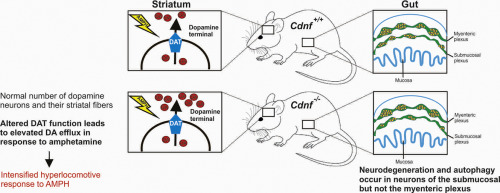当前位置:
X-MOL 学术
›
Neurobiol. Dis.
›
论文详情
Our official English website, www.x-mol.net, welcomes your
feedback! (Note: you will need to create a separate account there.)
Cerebral dopamine neurotrophic factor-deficiency leads to degeneration of enteric neurons and altered brain dopamine neuronal function in mice.
Neurobiology of Disease ( IF 5.1 ) Pub Date : 2019-11-26 , DOI: 10.1016/j.nbd.2019.104696 Maria Lindahl 1 , Alcmène Chalazonitis 2 , Erik Palm 1 , Emmi Pakarinen 1 , Tatiana Danilova 1 , Tuan D Pham 2 , Wanda Setlik 2 , Meenakshi Rao 2 , Vootele Võikar 3 , Jatta Huotari 1 , Jaakko Kopra 4 , Jaan-Olle Andressoo 1 , Petteri T Piepponen 4 , Mikko Airavaara 1 , Anne Panhelainen 1 , Michael D Gershon 2 , Mart Saarma 1
Neurobiology of Disease ( IF 5.1 ) Pub Date : 2019-11-26 , DOI: 10.1016/j.nbd.2019.104696 Maria Lindahl 1 , Alcmène Chalazonitis 2 , Erik Palm 1 , Emmi Pakarinen 1 , Tatiana Danilova 1 , Tuan D Pham 2 , Wanda Setlik 2 , Meenakshi Rao 2 , Vootele Võikar 3 , Jatta Huotari 1 , Jaakko Kopra 4 , Jaan-Olle Andressoo 1 , Petteri T Piepponen 4 , Mikko Airavaara 1 , Anne Panhelainen 1 , Michael D Gershon 2 , Mart Saarma 1
Affiliation

|
Cerebral dopamine neurotrophic factor (CDNF) is neuroprotective for nigrostriatal dopamine neurons and restores dopaminergic function in animal models of Parkinson's disease (PD). To understand the role of CDNF in mammals, we generated CDNF knockout mice (Cdnf-/-), which are viable, fertile, and have a normal life-span. Surprisingly, an age-dependent loss of enteric neurons occurs selectively in the submucosal but not in the myenteric plexus. This neuronal loss is a consequence not of increased apoptosis but of neurodegeneration and autophagy. Quantitatively, the neurodegeneration and autophagy found in the submucosal plexus in duodenum, ileum and colon of the Cdnf-/- mouse are much greater than in those of Cdnf+/+ mice. The selective vulnerability of submucosal neurons to the absence of CDNF is reminiscent of the tendency of pathological abnormalities to occur in the submucosal plexus in biopsies of patients with PD. In contrast, the number of substantia nigra dopamine neurons and dopamine and its metabolite concentrations in the striatum are unaltered in Cdnf-/- mice; however, there is an age-dependent deficit in the function of the dopamine system in Cdnf-/- male mice analyzed. This is observed as D-amphetamine-induced hyperactivity, aberrant dopamine transporter function, and as increased D-amphetamine-induced dopamine release demonstrating that dopaminergic axon terminal function in the striatum of the Cdnf-/- mouse brain is altered. The deficiencies of Cdnf-/- mice, therefore, are reminiscent of those seen in early stages of Parkinson's disease.
中文翻译:

脑多巴胺神经营养因子缺乏导致小鼠肠道神经元退化和脑多巴胺神经元功能改变。
脑多巴胺神经营养因子 (CDNF) 对黑质纹状体多巴胺神经元具有神经保护作用,并在帕金森病 (PD) 的动物模型中恢复多巴胺能功能。为了了解 CDNF 在哺乳动物中的作用,我们生成了 CDNF 基因敲除小鼠 (Cdnf-/-),它们是可行的、可生育的并且具有正常的寿命。令人惊讶的是,肠神经元的年龄依赖性损失选择性地发生在粘膜下层,而不是肌间神经丛中。这种神经元丢失不是细胞凋亡增加的结果,而是神经变性和自噬的结果。从数量上看,Cdnf-/-小鼠的十二指肠、回肠和结肠黏膜下丛中发现的神经变性和自噬远大于Cdnf+/+小鼠。黏膜下神经元对 CDNF 缺失的选择性易损性让人想起 PD 患者活检中黏膜下神经丛发生病理异常的趋势。相反,在 Cdnf-/- 小鼠中,黑质多巴胺神经元和多巴胺的数量及其在纹状体中的代谢物浓度没有改变;然而,在分析的 Cdnf-/- 雄性小鼠中,多巴胺系统的功能存在年龄依赖性缺陷。这被观察为 D-苯丙胺诱导的多动、异常的多巴胺转运蛋白功能,以及 D-苯丙胺诱导的多巴胺释放增加,表明 Cdnf-/- 小鼠大脑纹状体中的多巴胺能轴突末端功能发生了改变。因此,Cdnf-/- 小鼠的缺陷让人想起帕金森病早期所见的缺陷。
更新日期:2019-11-27
中文翻译:

脑多巴胺神经营养因子缺乏导致小鼠肠道神经元退化和脑多巴胺神经元功能改变。
脑多巴胺神经营养因子 (CDNF) 对黑质纹状体多巴胺神经元具有神经保护作用,并在帕金森病 (PD) 的动物模型中恢复多巴胺能功能。为了了解 CDNF 在哺乳动物中的作用,我们生成了 CDNF 基因敲除小鼠 (Cdnf-/-),它们是可行的、可生育的并且具有正常的寿命。令人惊讶的是,肠神经元的年龄依赖性损失选择性地发生在粘膜下层,而不是肌间神经丛中。这种神经元丢失不是细胞凋亡增加的结果,而是神经变性和自噬的结果。从数量上看,Cdnf-/-小鼠的十二指肠、回肠和结肠黏膜下丛中发现的神经变性和自噬远大于Cdnf+/+小鼠。黏膜下神经元对 CDNF 缺失的选择性易损性让人想起 PD 患者活检中黏膜下神经丛发生病理异常的趋势。相反,在 Cdnf-/- 小鼠中,黑质多巴胺神经元和多巴胺的数量及其在纹状体中的代谢物浓度没有改变;然而,在分析的 Cdnf-/- 雄性小鼠中,多巴胺系统的功能存在年龄依赖性缺陷。这被观察为 D-苯丙胺诱导的多动、异常的多巴胺转运蛋白功能,以及 D-苯丙胺诱导的多巴胺释放增加,表明 Cdnf-/- 小鼠大脑纹状体中的多巴胺能轴突末端功能发生了改变。因此,Cdnf-/- 小鼠的缺陷让人想起帕金森病早期所见的缺陷。











































 京公网安备 11010802027423号
京公网安备 11010802027423号